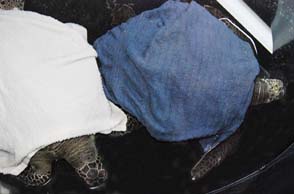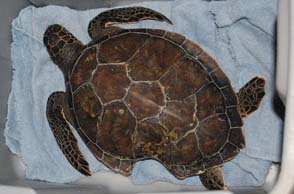It has happened again—-but a little earlier this year. For the second year in a row, consecutive days of near freezing temperatures have lowered the water temperature in the sounds, catching smaller turtles that feed there off guard. N.E.S.T. and National Park Service volunteers have found turtles along the length of Hatteras Island. One was found on South Ocracoke and started its trip to rehab with a ferry ride, courtesy of the N.C. State Ferry System.
As of December 9, there are 2 Kemps Ridley (normally found off the coast of Florida), 2 Loggerhead, and 5 Green sea turtles in the Rehab Center. Another 8 turtles are being evaluated at the Roanoke Island Animal Clinic before being transferred. One turtle died not long after arriving at the Clinic


Prompt action to bring a turtle’s body temperature back to normal is critical to their survival. A period of time under a damp towel in the 72 degree temperature of the rehab center is a good start. As the turtle warms and becomes more active, it is moved into a tank of first fresh and then increasingly salty water. The water temperature is maintained at 69-72 degrees. Veterinarians review intake x-rays and blood work to determine a treatment plan. Aquarists monitor physical changes and any injuries and perform lab tests to check glucose and other levels. They also perform treatments as needed, although most cold stunned turtles are free of external injuries. As appropriate, N.E.S.T. volunteers feed the turtle, change the water in its tank, and ensure a clean environment.
It takes many partners to rehabilitate these turtles and return them to the Gulf Stream—the ultimate rehabilitation goal. You can help too. Your donations will help with veterinary costs, buy rehab supplies, and pay for the gasoline to send the turtles to the warm blue waters of the Gulf Stream. To donate, click on the Donate button for a link to PayPal or send a check, made payable to:
Network for Endangered Sea Turtles
(N.E.S.T.)
P.O. Box 1168
Kitty Hawk, NC 27949
